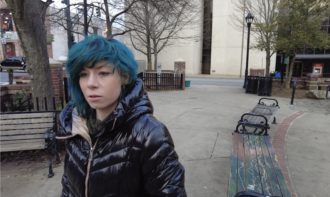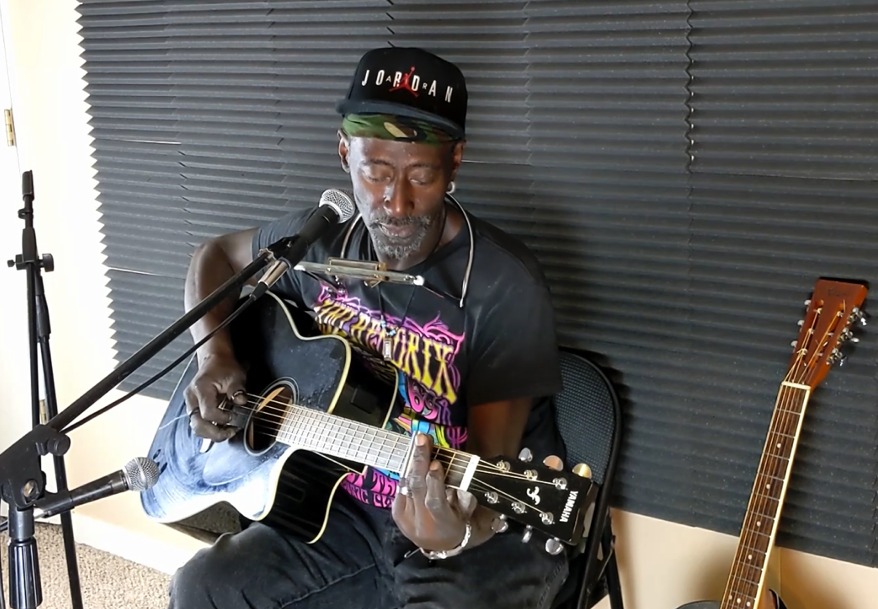Since its March debut on YouTube, the 35-minute documentary short film Homeless: A Human Story has been making the rounds of area nonprofits and aid organizations. The project is a collaboration between the Ramada Resident Council, a group of former homeless shelter residents, and Dan Pizzo, director of a nonprofit called Accessing Needed Crisis and Critical Help, Outreach and Resources Collaborative. Known as ANCHOR Collaborative, the organization sits at the intersection of behavioral health and affordable housing work.
On Friday, June 10, the film seeks its largest audience yet when it screens at the 500-seat Diana Wortham Theatre. The event includes blues music by one of the short’s subjects, Eric “The Blue Ridge Boy” Freeman; readings by local poet Daniel Suber; and a post-screening panel discussion with Freeman and fellow film subjects Eric Hall and Victoria “Little Bit” Gilbreath. The panel will be facilitated by Michael Hayes, executive director of Umoja Health, Wellness and Justice Collective, who was selected for his lived experiences being homeless in Asheville.
Tickets are being sold on a sliding scale. All are welcome, regardless of payment. Proceeds and funds raised will be distributed to various sheltering and homeless initiatives.
Having witnessed the documentary’s powerful effects on viewers at a previous screening, Hall hopes that the film continues to reach receptive audiences and makes people more aware of the plights of others. The greater the awareness, he says, the more likely that problem-solving and collaboration will occur to help resolve issues around homelessness.
Circle of trust
In early September, Pizzo met Hall during a tour of the temporary homeless shelter at the East Asheville Ramada Inn, and the two became fast friends. His curiosity was piqued by a sign on Hall’s door reading “Zen Lounge.” Residents, Pizzo learned, regularly gathered inside Hall’s room as a community meeting space. Sensing Hall’s leadership role, Pizzo ran the idea of a resident council by Hall, who supported the notion.
“Something I’m really passionate about is hearing the people rather than the professionals having their way,” Pizzo says. He notes that in his 15-plus years of working “in the helping field,” he’s seen few instances where aid organizations promote autonomy within such spaces.
Since its formation last September, the Ramada Resident Council has attended neighborhood association meetings and public engagement meetings concerning sheltering and housing issues. The council has also conducted community cleanup projects and hosted various community leaders for tours of the Ramada shelter. Over that time, Hall says 116 people have come through the Ramada and only 11 have yet to find housing.
Those 11 include Hall himself, who’s passed up seven opportunities thus far in order for others to go first. But he notes that the remaining former residents — some of whom have returned to the streets after the temporary shelter closed March 31 — are set to receive housing “within weeks.” California-based for-profit developer Shangri-La Industries is set to take ownership of the Ramada within the next couple of months, and Hall has remained at the Ramada as a Shangri-La employee as the temporary shelter is being converted into permanent supportive housing. California-based nonprofit Step Up on Second Street will provide supportive services for the new residents.
Wanting to raise awareness of the individual stories of those experiencing homelessness, Pizzo began thinking about producing a video. The finished work could then be used for training organizations that work with the unhoused, as well as businesses whose staff regularly interacts with the homeless population. But despite the video’s possibilities for good, Pizzo also recognized its potential for exploitation.
“I didn’t want to create poverty porn,” Pizzo says. “I think that people’s stories are really precious, and when you come in with some money and this idea, oftentimes it can seem alluring, but then [the homeless people’s] story is out there — and your story might change one day.”
In order to remove himself from the equation and give creative control to the Ramada Resident Council members, Pizzo decided to hire the council to produce the film, with the understanding that if they didn’t like the end result, they could opt to scratch the project while still receiving the agreed-upon compensation.
To shoot the documentary, Pizzo hired local musician Ben Phan, who’d been expanding his videographer projects under the name Ben Phantom. The day after the Dec. 14 Asheville City Council meeting where the Ramada’s purchase rights were assigned to Shangri-La, Phan participated in a two-hour jam session at the Ramada with Pizzo (auxiliary drums), Hall (drums) and Freeman to help heal from hurtful public comments that continued to bother the Ramada residents.
Through music, a bond was formed, and over the next six weeks, Phan met with Hall, Freeman and Gilbreath to document their stories and, in Pizzo’s words, try to bring down some of the walls that separate people with different experiences. All three are credited as co-producers, along with fellow former Ramada residents Jeff “ATL” Davis and Steve “Steve-O” Defosses.
Hall says it was difficult to put himself out there, knowing one of the hardest times of his life would be viewed by strangers. Even now, he notes, “I have a hard time watching it, but it’s getting easier.”

The power of film
During the film’s production, Pizzo was working with Trinity United Methodist Church’s pop-up emergency shelter, which filled the service gaps of Code Purple shelters — opened when temperatures drop to freezing or colder — that aren’t conducive to families, single-father families, couples and people with pets. Knowing that the Ramada Resident Council was proud of the film and wanted to share it, Pizzo arranged for a screening in Trinity’s basement, followed by a panel discussion. Approximately 80 people attended, half of whom were without housing and staying at the shelter.
“You could hear the gasps and the laughter,” Pizzo says. “You could feel that thick emotion, and it really centered the discussion around the panel.”
The emotional weight of the event manifested near the end of the evening, when an older man stood with tears in his eyes and asked everyone to stand in a circle, hold hands and pray.
“No matter who you are, you can relate to the human aspects of these stories — even the ones that might be quite different from our personal histories,” Pizzo says. “Whether people feel excitement, hope or discomfort, we want them to do a little bit of self-inquiry.”
He adds that people are often simply told to donate money or volunteer their time, whereas he and his fellow film collaborators see Homeless and the conversations around it as an opportunity to reduce the distance between humans having different experiences — a sentiment with which Hall wholeheartedly agrees.
“There’s so many different aspects that I wasn’t aware of before I [became homeless]. It changed me a lot — not from being a bad guy to a good guy or something like that, but from going down the street with blinders on to seeing all of this that’s in the middle,” Hall says. “Now I see it every time I walk out, and I should have been aware of [other people’s suffering]. Well, now I am, and hopefully nobody has to go through that to be aware. Hopefully this [film] will bring some awareness without putting you out there to have to live it.”
WHAT: Homeless: A Human Story
WHERE: Diana Wortham Theatre, 18 Biltmore Ave., avl.mx/bn5
WHEN: Friday, June 10, 7 p.m. $0-20 sliding scale




Yeah I’ve been waiting for years to get house still ain’t got house don’t see it happening in the housing now this movie hits
My wife used to put out her empty beer bottles near the curb. Since she was an alchy, that turned into a lot of bottles daily. This garnered the attention of the local homeless who would come by and bag the bottles and take them to the recycle place for a nickle a bottle. I’m a disabled vet, given a 10 speed bike from the late 80’s in mint condition by a VA rep whose wife it belonged to. She couldn’t use it because of MS. I used that bike for everything, it was part of my rehab that took 11 years to walk again without pain. At one point I went 9 months without driving because I owned that charity bike. Went out to the front porch one morning drinking my coffee. Saw a rusty 20″ bike with flat tires and torn up seat tossed on my lawn. I immediately knew an “unauthorized trade” had occurred, and looked over to my railing on the right of the porch where I chained my 10 speed. Nothing but a broken chain. Thanks homeless person for stealing my bike. Thanks for letting my two young kids know what type of world we live in. Thanks for rationalizing why it’s okay to steal rehab equipment from a disabled vet putting himself through college by working part time at a job across town who used that bike to keep it going. Thanks homeless dude, thanks.